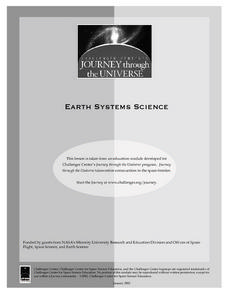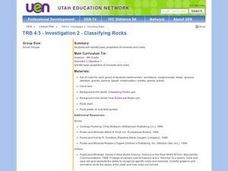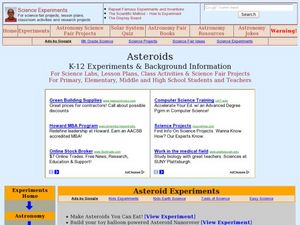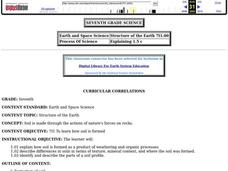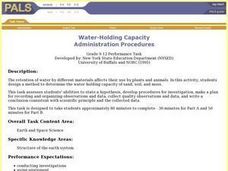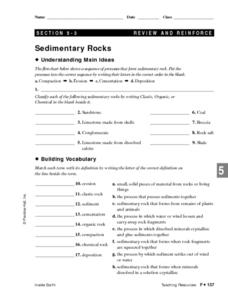Curated OER
My Time
Middle schoolers create a timeline of their lives. In this timeline lesson, students discuss relative and absolute time. They use events in their lives to create categories on a timeline. They link this lesson to geologic timelines.
Curated OER
Dating Popcorn
Students simulate the dating process with popcorn. In this geology lesson plan, students discuss how geologist find the age of rocks by gauging the amount of decay of radioactive elements. They have 6 bags of popcorn and each group...
Curated OER
Exploring Rocks
Students recognize differences in the size, shape, texture, and color of different rocks. In this rocks lesson plan, students also learn and repeat back how a volcano erupts and make one out of a toilet paper tube.
Curated OER
Plate Tectonic - Volcanoes (1)
Young scholars learn the different shapes of Volcanoes and discuss why volcanoes only have a few shapes.
Curated OER
Weather: It Works, or Not?
Students discover the techniques meteorologists use to examine the atmosphere. In groups, they build their own weather station and observe the various weather conditions. They identify the types of weather patterns that allow the...
Curated OER
Reservoirs and Production
Students complete activities for a lesson about reservoirs and production. In this geology lesson, students complete a 7 page packet of activities to explore porosity, permeability, and rock properties.
Curated OER
Investigation 2 - Classifying Rocks
Fourth graders identify basic properties of minerals and rocks. They access websites and utilize worksheets imbedded in this instructional activity to further their understanding of rock classification.
Curated OER
Volcano!-Thar She Blows!
Students describe how volcanoes are formed. They name the types of boundaries where volcanoes occur. They utilize models to illustrate the occurence of volcanoes and earthquakes along plate boundaries. They compare and constrast the...
Curated OER
Groundwater as Part of the Water Cycle
Ninth graders study the effects of soil and rocks on filtering groundwater. In this groundwater lesson students complete a lab activity that includes sources of contamination.
Curated OER
Asteroids
Students examine a potential asteroid impact site. They describe evidence and theories for extinction events.
Curated OER
Soil Formation
Seventh graders investigate how soil is formed. They analyze types of soil samples, examine soil using a magnifying glass or microscope, complete a chart, conduct a soil and plant experiment, and construct a soil profile.
Curated OER
Getting to Know Soil
Students make predictions and analyze soil. In this soil properties lesson, students make predictions about soil properties for various soil samples. Students examine the types of soils and record their observations. Students analyze...
Curated OER
Planetary Weather
Pupils study the weather on other planets in our solar system. In this planetary weather lesson students create a display of the different weather conditions on the other planets.
Curated OER
Water-Holding Capacity
Students design and conduct an experiment to compare the water-holding capacity of sand, soil, and moss. They measure the change in weight for each material after adding the same amount of water to each material.
Curated OER
Sedimentary Rocks
Second graders receive an introduction to the rock cycle. They dicuss the geologic rock cycle. They create a simulation of a sedementary rock.
Curated OER
Sculpt-a-Planet
Students study the moon and the planets. They create a painted, paper mache moon or planet sculpture.
Curated OER
How Volcanoes Grow
Pupils study volcanoes including rock fragments, ash, aerosols and gases. In this volcano lesson students divide into groups and build models of the three major types of volcanoes.
Curated OER
Personal Written Response Activity
Pupils complete a final written project. In this personal response lesson, students respond in a creative way to one of the issues presented in the unit. Pupils may choose to create a series of postcards from a natural disaster,...
Curated OER
Meteorology Madness
Students probe the dynamic weather changes through several hands-0n activities in this seven lessons unit. The hydrologic cycle, clouds, atmosphere, air movement, fronts, and forecasting form the components presented in this unit.
Curated OER
Thinking About Newton's 1st Law
Students discuss the lives of both Aristotle and Newton in order to bring important differences between the two to the forefront. They evaluate two statements about motion and use the ideas from the discussion to determine which...
Curated OER
Earthquakes
Students observe the melting of ice. In this phase change instructional activity, students observe ice as it melts. They discuss the process and create a Venn diagram comparing water and ice.
Curated OER
Reading Weather Maps
Fourth graders the symbols that are used on weather maps. They develop five day forecasts based on information they gather from weather maps in the newspaper and on the Internet.
Curated OER
Wonders of Weather
Students understand the destructive force of a tornado. They learn the role of a thunderstorm in the creation of a tornado.
Curated OER
Metals, Nonmetals, Metalloids
Students recognize that metals, nonmetals, and metalloids have common attributes. They Identify physical and chemical properties. Students define ores and identify where ores can be found.




